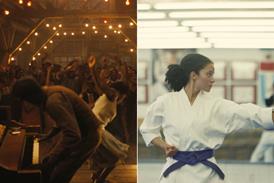Dir: Zhang Yang. Chi-HK.2005. 128mins.
With SunflowerZhang Yang (The Shower, Quitting) returns with anotherconfrontational saga between father and son, this time in the shape of alargely autobiographical tale that runs from the eve of the Cultural Revolutionup until the present day.
Focusing on a single familywhose history is supposed to reflect on that of the nation, the film deals, asZhang himself admits, with material that is often personal and therefore muchmore difficult to keep in perspective. The result is Zhang's most elaborate,but also his longest, melodramatic and least controlled work to date.
Though Chinese audiencesmight find much to identify with, those further afield may find it a trip throughfamiliar territory that does not offer any new elements, either personal orhistorical. Zhang's name and the presence of Joan Chen in one of the lead rolesmight help the film to access art circuits around the world, but its appealwill ultimately prove to be more limited than his earlier work.
With two births forbookends, the picture is essentially the story of Zhang Xiangqiang, born in1967 - during the Cultural Revolution - but whose father is deportedimmediately afterwards.
He only returns home tore-assume his role as head of the family in 1976, and comes from the very firstmoment into direct conflict with his son - a conflict which remains unresolveduntil the end of the film.
Picking three key moments inthe chronicle of the Zhang family (it is hardly a coincidence that they bearthe same name as the director), the picture highlights the father's return, thefailed attempt of his son to break away from his parents after he graduatesfrom high school in 1987, and finally the relationship between the adult son -now a successful painter - and his retired parents in 1999.
The same themes echothroughout all three episodes, each of which deals with the incessant warbetween Gengnian (Haiying) and his son who rebels against everything that hisfather tries to impose on him.
Gengnian, once a promisingpainter who was deprived of his career after being beaten over the hands in're-education camps', would like to see his son achieve everything hecouldn't. A stickler for tradition, keeping face at all costs and childrenobeying their elders, he carries a gigantic chip on his shoulder as the resultof persecution.
The son, Xiangqiang (playedby Zhang Fan as a child, Gao Ge as an adolescent and Wang Haidi as an adult),is introduced as an unrepentant nine-year-old prankster when he first meets hisfather in 1976 and naturally rebels against this new uncalled for figure ofauthority who shares his mother's bed. If this man, who claims to be hisfather, wants him to paint, then Xiangqiang will do everything in his power toshow his aversion to art, going so far as trying to maim himself.
The conflict between thegenerations soldiers on, and though Xiangqiang ultimately does accede to hisfather's dream, their relationship is edgy and explosive until the very end.
Between the two of themstands Xiuqing (Chen), a practical woman concerned with the well-being of herfamily, first last and foremost. She tries to establish some kind of bridgebetween the two men in her life, but always supports the father against the sonwhen push comes to shove.
Zhang backgrounds thenarrative with all the historic touchstones of the period, from the end of theCultural Revolution and the death of Mao and the subsequent early opening ofChina to the West to the changes in contemporary China (indeed, China haschanged so much in recent years that Sunflower had to be shot onsoundstages due to the lack of surviving original locations).
The concept of dealing withhistory through personal stories is an old one, but the problem here is lessthe concept, more the dramatic material supplied by the script.
Zhang, whose background isin stage rather than film, seems to be treading on dangerous ground here,evoking painful memories for himself and those around him. This may explain whySunflower's portrayal of the family cell as the basic unit of Chinesesociety is so painstakingly drawn out, with the clash between generationsunderlined - but to the expense of specific characters and events.
Having a decade's intervalbetween one episode and the next also allows too much self-indulgence andseveral loose threads. The individual characters are also too emblematic fortheir own good, as if Zhang fears that too much identity might prevent themfrom correctly representing their respective generations.
With such responsibility ontheir shoulders, Chen, Sun Haiying and all three representations of Xiangqiangat various ages can only acquit themselves respectably and too often feelsomewhat remote.
The more affecting partsemerge rather from supporting cast, like Liu Zifeng as the next-door neighbourwho unwittingly sent the father to the camps, or Zhang Yue as a young skaterand free spirit whose tentative affair with the adolescent Xiangqiang isbrutally terminated by the boy's father.
Production companies
Fourth Production Company of China Film Group Corp
Ming Productions
Beijing Film Studio
International sales
Fortissimo Films
Executive producer
Yang Buting
Producers
Peter Loehr
Han Sanping
Co-producers
Michael J Werner
Wouter Barendrecht
Screenplay
Zhang Yang
Cai Shangjun
Huo Xin
Cinematography
Jong Lin
Editor
Yang Hongyu
Production design
An Bin
Huan Xinming
Music
Lin Hai
Main cast
Sun Haiying
Joan Chen
Liu Zifeng
Zhang Fan
Gao Ge
Wang Haidi
Yu Hong
Horn Li


















No comments yet